Fly an AMA Nationals winner!

Quickie 500 (Q500) pylon racing has been around for many years and is quite popular as this class of racing is inexpensive to get into and a lot of fun. The first Quik-V was designed by Jim Allen in 1987 and was the first shoulder-wing, V-tail configuration for Q500 racing. Since then, the Quik-V has gone through many changes after testing and competition. While there have been other versions of the Quik-V, the current V6 version incorporates all the lessons learned in more than 30 years.
Undertaking a simple design like a Quickie 500 might seem like a simple task, but rest assured, it’s not. There are many things to consider, and the model must be light yet strong to withstand the stresses of racing. This model has all those attributes. Before going any further, understand that this airplane isn’t for the faint of heart; it’s a full-blown racing machine that’s very competitive in AMA 424 Sport Quickie and AMA 426 Super Sport Quickie racing. With that in mind, advanced flying skills are required, and it should be flown only at an approved AMA flying site. But when toned down with a sport-type engine, the Quik-V6 makes a fun, go-fast model for pilots that have the need for speed! Great Planes, which realized that the sport needed an inexpensive all-wood-and-foam model that could compete with a costly all-composite model, brings us the Quik-V6 Q500. This remarkable Q500 pylon racer has many features that will help you get it into the air quickly and have a fast racer right from the box. Things that make for a quick build include a balsa-sheeted foam-core one-piece wing that’s reinforced with carbon fiber and fiberglass, drag-reducing internal linkages for the ailerons and V-tail, racing wheels, and an aluminum back-plate mount. Let’s take a closer look.
UNIQUE FEATURES
This story is from the {{IssueName}} edition of {{MagazineName}}.
Start your 7-day Magzter GOLD free trial to access thousands of curated premium stories, and 9,000+ magazines and newspapers.
Already a subscriber ? Sign In
This story is from the {{IssueName}} edition of {{MagazineName}}.
Start your 7-day Magzter GOLD free trial to access thousands of curated premium stories, and 9,000+ magazines and newspapers.
Already a subscriber? Sign In
Legend Hobby / Seagull Models - Cessna Grand Caravan 208
The Cessna Grand Caravan 208 is a legend in aviation circles. A single engine utility aircraft that punches up with capabilities that rival many twin engine aircraft in its class. Its seemingly simple configuration belies its near extreme utility.
PROPER CG LOCATION FOR AEROBATICS
If you are getting into aerobatics and are starting to perform more advanced maneuvers, it is time to discuss ways you can not only become a better pilot, but how you can also improve the flight characteristics of your airplanes.
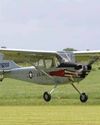
Legend Hobby 13-Foot L-19 Bird Dog/ Cessna O-1
This famous multi-mission single engine observation aircraft served from 1950-1974. From calling out target locations to providing intel/recon information, the Bird Dog was a valued asset in both the Korean War and Vietnam.
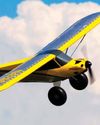
EARN YOUR WINGS
10 Tips for First-Flight Success
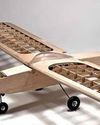
Old School Model Works Fifty Six
The Fifty Six takes its design cues from the original .09- to .15-size Carl Goldberg Falcon 56 of the 1960s. Reworked to incorporate modern, lasercut techniques to make kit building better than ever.
FLYING TWINS Multi-engine warbirds made easy
Let’s face it, there’s just something extra special about twin-engine RC aircraft. Most modelers stop what they’re doing when a twin fires up on the flightline.
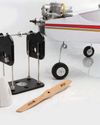
HOW TO BALANCE PROPELLERS
Four easy steps to increase performance and reduce vibration
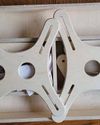
PRODUCT REVIEW: RC PLANE STANDS BENCHTOP MODEL
I’m a sucker for shop stuff. I buy tools I will probably never use just because they are cool, or I might need to use them someday. When Glen from RC Plane Stands reached out about a review, however, I knew as soon as I browsed their website that I would be receiving something I would use a lot, maybe even daily.
SPIRIT OF RHINEBECK AWARD WINNER
A close up of Norman Malinowski’s 1/3-scale Albatros
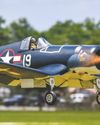
CENTER OF GRAVITY BASICS
The secret to a plane that flies well